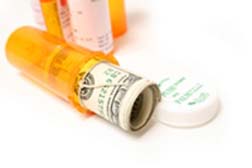LawyersandSettlements.com, November 7, 2010
by Heidi Turner
Among Seroquel side effects is a reported increased risk of Seroquel diabetes. Lawsuits alleging patients suffered serious Seroquel side effects reportedly hurt AstraZeneca’s third-quarter results.
 According to the UK Press Association, AstraZeneca set aside $203 million to resolve approximately 18,000 claims in the US that Seroquel, a schizophrenia treatment, caused diabetes and other serious Seroquel side effects. A further $270 million was reportedly put aside for other claims and to cover AstraZeneca’s legal costs.
According to the UK Press Association, AstraZeneca set aside $203 million to resolve approximately 18,000 claims in the US that Seroquel, a schizophrenia treatment, caused diabetes and other serious Seroquel side effects. A further $270 million was reportedly put aside for other claims and to cover AstraZeneca’s legal costs.
In August 2010, AstraZeneca said it settled approximately 17,500 lawsuits alleging Seroquel caused diabetes and other injuries for approximately $200 million. The lawsuits alleged the drug maker failed to adequately warn patients about the drugs’ risks.
Further eroding AstraZeneca’s profits are the effects of generic competition.
According to the San Francisco Chronicle (10/28/10), AstraZeneca reported net income of $1.55 billion in the third quarter, compared with $2.12 billion in the same quarter in 2009. The Wall Street Journal (08/10/10) reports worldwide sales of Seroquel reached almost $5 billion in 2009.
Meanwhile, an advocacy group called Taxpayers Against Fraud Education Fund alleges that the pharmaceutical industry is the number one source of Department of Justice (DOJ) fraud-related settlements. Number one on the list of pharmaceutical companies to settle with the DOJ was Allergan Inc., which paid $600 million to settle allegations of illegal marketing of Botox.
Second on the list was AstraZeneca, which paid approximately $520 million for the alleged illegal marketing of Seroquel.
Marketing of drugs is not illegal. What is illegal is marketing drugs for uses that have not been approved by the US Food and Drug Administration (FDA). Although Seroquel is approved to treat schizophrenia and bipolar disorder, it is not approved for use as a sleep aid, or to treat post-traumatic stress disorder or obsessive-compulsive disorder. It is also not approved for use in children younger than age 10, according to the US FDA-approved medication guide.
A study published online in BMJ (09/22/10) suggests that Seroquel is linked to an increased risk of blood clots. According to the study, of the patients included who were diagnosed with venous thromboembolism (VTE), 8.3 percent had received an antipsychotic medication in the two years prior to diagnosis, compared with 5.3 percent of those not diagnosed with VTE. The highest risk of VTE was found in patients who took quetiapine (known by the brand name Seroquel).
http://www.lawyersandsettlements.com/articles/15347/seroquel-side-effects-diabetes-16.html


SHARE YOUR STORY/COMMENT